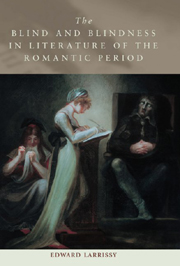Book contents
- Frontmatter
- Contents
- Preface
- Acknowledgements
- 1 The Enigma of the Blind
- 2 The Celtic Bard in Ireland and Britain: Blindness and Second Sight
- 3 Blake: Removing the Curse by Printing for the Blind
- 4 Edifying Tales
- 5 Wordsworth's Transitions
- 6 Coleridge, Keats and a Full Perception
- 7 Byron and Shelley: The Blindness of Reason
- 8 Mary Shelley: Blind Fathers and the Magnetic Globe: Frankenstein with Valperga and The Last Man
- 9 Conclusion
- Bibliography
- Index
Preface
Published online by Cambridge University Press: 12 September 2012
- Frontmatter
- Contents
- Preface
- Acknowledgements
- 1 The Enigma of the Blind
- 2 The Celtic Bard in Ireland and Britain: Blindness and Second Sight
- 3 Blake: Removing the Curse by Printing for the Blind
- 4 Edifying Tales
- 5 Wordsworth's Transitions
- 6 Coleridge, Keats and a Full Perception
- 7 Byron and Shelley: The Blindness of Reason
- 8 Mary Shelley: Blind Fathers and the Magnetic Globe: Frankenstein with Valperga and The Last Man
- 9 Conclusion
- Bibliography
- Index
Summary
For many writers of the Romantic period, the blind are necessarily associated with the idea of intense inward vision. Homer, Ossian and Milton provide obvious models. The age that became so fascinated by the bardic past was also fascinated in particular by the blind bard. Yet it understood that phenomenon as an historical one. Such visions were appropriate to an earlier age: they had to give way to the abstraction, organisation and commerce of modernity. This very course of events had been foretold by the blind bard who sang ‘Rule Britannia’ in Mallett and Thomson's Alfred: A Masque (1740), an anthem in which he foresaw Britain's future commercial prosperity. Ann Batten Cristall constructs an historical account of visionary blindness from such postulates.
Yet in the Enlightenment, the blind, who are the subject of intense philosophical scrutiny, are shown to be very capable, despite the bars to sympathy and empirical learning which make them such tempting test cases. Some of the popular moral tales in which they figure make this point in a quite prosaic manner, which is nonetheless very instructive about the role they play in more polite literature. Most of all, though, they are thought to enjoy the compensations of enhanced sensitivity to music and to words. This compensation becomes associated with the loss and gain inherent in the modernity of a post-bardic age. In particular, poets may learn to value such mastery of sound and association and find a richness in these which compensates for, and even surpasses, the lost intensity of inner vision. Such was Milton's power.
- Type
- Chapter
- Information
- Publisher: Edinburgh University PressPrint publication year: 2007



